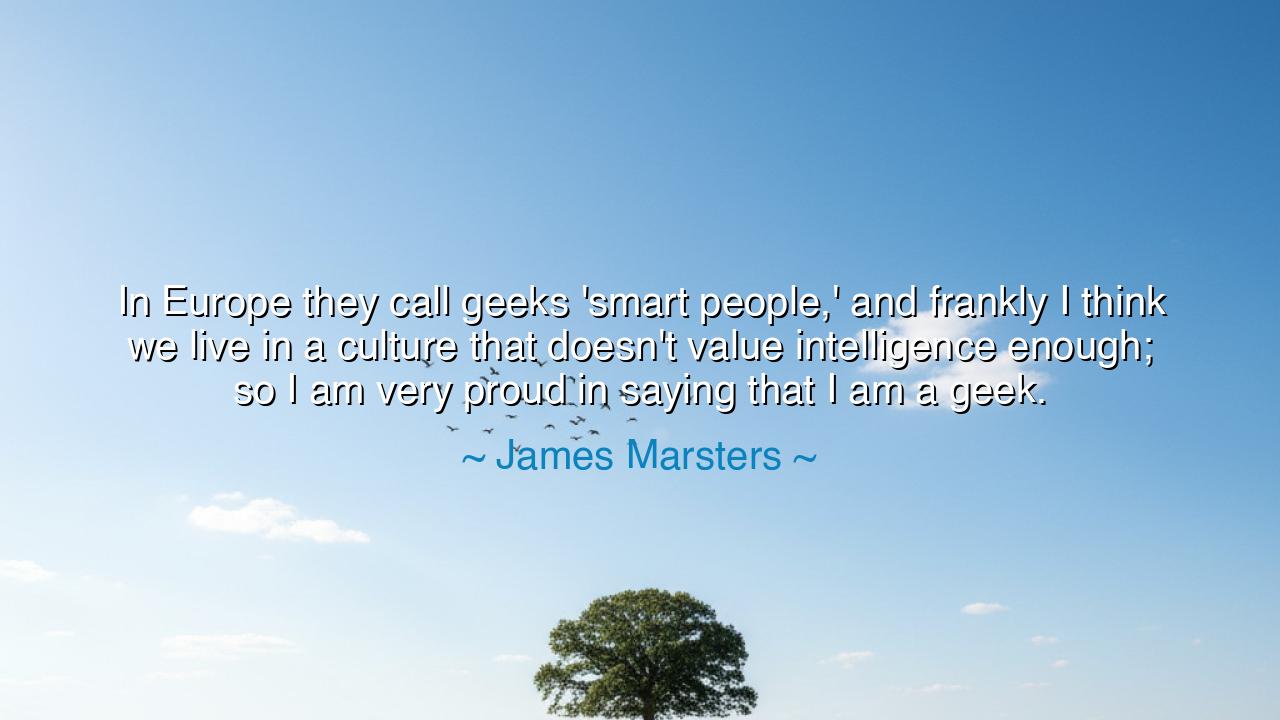
In Europe they call geeks 'smart people,' and frankly I think we
In Europe they call geeks 'smart people,' and frankly I think we live in a culture that doesn't value intelligence enough; so I am very proud in saying that I am a geek.






The words of James Marsters, spoken with both humility and quiet defiance, shine like a torch in an age that too often mistakes noise for wisdom: “In Europe they call geeks ‘smart people,’ and frankly I think we live in a culture that doesn’t value intelligence enough; so I am very proud in saying that I am a geek.” In this declaration lies not the boast of pride, but the cry of one who has seen the sacred flame of intellect dimmed by the shadows of vanity and ignorance. Marsters speaks for the thinkers, the dreamers, the builders — for those who live not by applause, but by curiosity, imagination, and the relentless pursuit of truth. His words remind us that to love knowledge is not to be strange — it is to be fully human.
In the ancient world, the thinkers were honored as warriors of the mind. In Greece, the philosophers — lovers of wisdom — were not mocked, but revered. Socrates walked barefoot through the streets of Athens, stirring the hearts of youth with questions that pierced illusion. Archimedes, the mathematician of Syracuse, was so lost in thought that he drew circles in the sand while war thundered around him — and yet, his insights changed the very course of science. To these ancients, intellect was divine, and the mind was a temple. They would have recognized in Marsters’ “geek” not an outcast, but a seeker, one who strives toward the infinite with the power of thought.
But in later ages, the flame of intellect was too often misunderstood. In the bustling courts and marketplaces of modern civilization, the clever and the curious became objects of jest. Those who spoke of stars, of logic, of code and theorem, were branded as strange — as “geeks,” as though their devotion to knowledge made them lesser. Yet the irony, as Marsters observes, is that it is these very souls who build the bridges, discover the medicines, and imagine the worlds upon which others depend. To be a geek, in truth, is to carry the legacy of every philosopher, inventor, and poet who ever dared to ask, “Why?”
Consider the life of Alan Turing, the quiet mathematician who helped end a world war. Mocked for his difference, misunderstood by the very society he saved, he broke the unbreakable code of Enigma and turned the tide of history. Yet his genius was not celebrated until long after his death. His story is the embodiment of Marsters’ lament — that too often, the world praises strength and spectacle while neglecting the deeper, gentler power of intelligence. Turing’s tragedy teaches us that when a culture mocks its thinkers, it cripples its own progress. But when it honors them, it builds its future upon wisdom and truth.
There is a quiet heroism in the geek’s journey — a life spent in pursuit of understanding, even when the world does not understand you. The path of the intellectual is not one of glamour, but of perseverance. To think deeply is to stand apart, for true thought requires courage — the courage to question what others accept, to persist when others laugh, and to see beauty in what others overlook. The geek, in this sacred sense, is not merely one who studies or calculates, but one who cares deeply, who loves knowledge as others love the sun, and who, through that love, brings light to all.
Thus, Marsters’ pride is not arrogance, but affirmation — the reclaiming of a word once used to wound, turning it into a badge of honor. To say “I am a geek” is to declare allegiance to the eternal quest for understanding, to the belief that the mind is as noble as the sword, and that wisdom is the highest form of strength. His words invite us to reawaken our respect for intellect, to cherish those who think differently, for they are the architects of tomorrow.
Let this teaching sink deep into your heart: never be ashamed of your mind. In a world that worships appearances, be one who values truth. In a culture that rewards noise, be one who listens and learns. Seek knowledge with devotion, share it with compassion, and walk proudly in the light of understanding. For as long as there are those who dare to think, to question, to imagine — the human spirit will never be dimmed. And when we learn, as Marsters urges, to let our intellect, curiosity, and courage work together, then perhaps we shall remember that wisdom — not wealth, not beauty, not fame — is the true crown of humanity.






AAdministratorAdministrator
Welcome, honored guests. Please leave a comment, we will respond soon